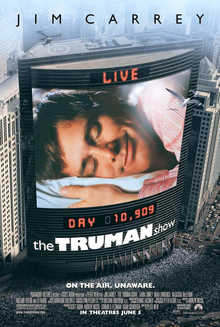Headphoning it In: “The Truman Show” Reimagined

Truman Show
February 28, 2020
The Truman Show is an existential trip of a film about the reality TV show revolving around Jim Carrey’s titular character, Truman Burbank, that he is completely unaware exists. His life unfolds within a simulated world, populated entirely by actors and broadcasted on live television through hidden cameras. The show’s façade slowly begins to unravel and Truman must navigate a life in which he has never truly experienced freedom. In an effort to not spoil the plot of one of my all-time favorite movies, I am hesitant to say more than what is presented in the trailer. The film leaves the viewer in a perpetual state of existential thought since the invasive, dystopian, science fiction experiment put forth by Ed Harris’ character, Christof, does not seem too far off from our current reality.
Beyond moving me to create a perfect Truman-inspired playlist, this masterpiece’s influence is infinite. For starters, the movie itself is already complemented by a rich soundtrack that matches the underlying eeriness of a dramedy that, on the surface level, seems so harmless. Burkhard Dallwitz’s score features collaborations with the esteemed composer Phillip Glass and, needless to say, they created a flawless musical accompaniment. In addition, if The Truman Show sounds familiar it could be due to BROCKHAMPTON’s song “1998 Truman” which is directly named after the film and the year of its release. Having made my pitch for The Truman Show and everything this classic stands for, I present a playlist for my favorite movie.
Billy Fury’s “Wondrous Place” is a simple crooning ballad with a central message of loving the place in which the most comfort is felt. At an initial listen, the song embodies a feeling of contentment, adoration, and calm within a world of love and security. However, with Truman in mind, its repetitive nature plays out like a necessary reassurance, as if trying to be convinced of a constructed world that can fulfill any and all internalized desires.
The Voidz’s “ALieNNatioN” brings together a segmented, synth-driven instrumentation with Julian Casablancas robotic vocals. In a song with range from filtered, echoed droning to pitched up harmonies, the spotlight is on the blissful ignorance of alienation in a politically driven world. The duality of isolation in a world of pretenders ties into the ethical considerations of an anti-Truman Show movement in the film along with Truman’s unwinding grasp on a simulated blissful reality.
Tame Impala’s “Love/Paranoia” entangles the emotional insecurities that intersect at the two feelings specified in the song’s title. The fabricated world Truman lives in is dependent on him, his daily routine, and his blissful ignorance in order to thrive. This psychedelic anthem is emotionally exposed and hinges on paranoia, mirroring Truman’s struggle to come to terms with a constructed life completely out of his control.
Johannes Brahms’ “Symphony No. 3 in F Major Movement III” may seem out of place, but it is a classic piece that could meld perfectly into the film’s score. The highs and lows of the woodwinds and strings trade off attention while maintaining a consistent sonic balance. The twinges of hope, sorrow, confusion, and anxiety exemplified within the movement allow for an added understanding of the war inside Truman’s mind.
Drugdealer’s “It’s Only Raining Right Where You’re Standing” evokes the soft psychedelic sound of the introspective pessimist. The cascading synthesizer notes create the imagery of raindrops falling on a rainy day, and the element of self-reflection is lyrically prominent. The track is reminiscent of The Beatles’ sound on “Rubber Soul” or “Revolver,” and is commanded by Drugdealer’s lonely, monotone voice. Undoubtedly, the song title is more than relevant, pulled right from of one of the best moments in The Truman Show.
Melody’s Echo Chamber’s song titled “Quand Vas Tu Rentrer” translates to “When Will You Return,” a question that racks Truman’s mind in his quest for reconnecting with those from his past and for finding the truth within himself. The retro instrumentation rounds out the psychedelic obsession that encapsulates The Truman Show and its dreamy atmosphere.
Lana Del Rey’s “Get Free” taps into the unfulfilling yearning for more and the need to be free from whatever semblance of reality exists. Coupled with a soulful bass, the angelic vocal harmonies sing out, “I never really noticed that I had to decide, to play someone’s game or live my own life,” which is a weight felt by Truman, whether he is aware of it or not, when challenged by Christof, the mind behind his semblance of reality. The melancholy-tinged sense of calm that Del Rey has honed in on in her sonic endeavors could not be more perfect in declaring a commitment to discovery outside of the mind’s, or Christof’s, boundaries.














